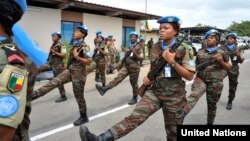There is plenty of evidence that if peace efforts are to succeed, women must be involved in the process. But too often in the past, women have been shut out of participating in peace negotiations and peacekeeping.
That is why four years ago, the U.S. Department of State released the U.S. National Action Plan on Women, Peace, and Security, which seeks to ensure that women participate equally in preventing conflict and building peace in countries threatened and affected by war, violence, and insecurity.
The Global Peace Operations Initiative, or GPOI, is a part of this effort. It is a U.S. Government-funded security assistance program that works with partner countries to deliver the training and tools needed to help stabilize countries in conflict and support United Nations and regional peace operations.
One of GPOI’s key tenets is to engage, consult and protect women in all aspects of peace operations. And so, of the nearly 200,000 personnel that GPOI has helped to train and deploy to peace operations worldwide, more than 6,000 have been women.
Latin American nations have a long history of peacekeeping operations. So, working with regional partners, GPOI has helped develop and build a regional mobile training team of U.S. and Latin American experts on gender issues, human rights, organizational development, and peacekeeping. Now they are mentoring future peacekeepers in Latin America on issues such as enhancing the role of women in deploying peacekeeping forces, and training peacekeepers to better interact and engage with the women in the societies they are charged to serve and protect.
“While working to address the growing global demand for peacekeepers, the United States remains steadfast in the effort to increase the participation of women as peacekeepers as well as expanding their role and leveraging their perspective -- all of which help protect other women in some of the world’s most challenging global hotspots,” wrote Stephanie Purdie, a Program Analyst for Strategy at the State Department.
“By encouraging and supporting collaborative training initiatives with leading peacekeeping contributors, we build upon our partners’ historical peacekeeping perspectives and create an avenue through which to exchange expertise, experiences, and ideas, which in turn creates more credible and effective peacekeepers.”






